Leadership in Organizations: Personal Experience and Bezos Analysis
VerifiedAdded on 2020/12/09
|13
|4724
|457
Report
AI Summary
This report delves into the multifaceted concept of leadership, commencing with a critical self-reflection on personal leadership experiences within the context of voluntary work at Oxfam. It identifies areas for development and proposes an action plan to enhance leadership skills. The report then transitions to an in-depth analysis of Jeff Bezos's leadership at Amazon, utilizing various leadership theories and concepts to evaluate his approach. It examines the application of transformational, transactional, and situational leadership styles, as well as the use of trait and behavioral approaches. The analysis explores how Bezos employs these theories to motivate employees, foster a customer-centric culture, and drive Amazon's success. The report provides a comprehensive overview of leadership, merging personal experiences with a critical evaluation of a prominent leader in the business world.
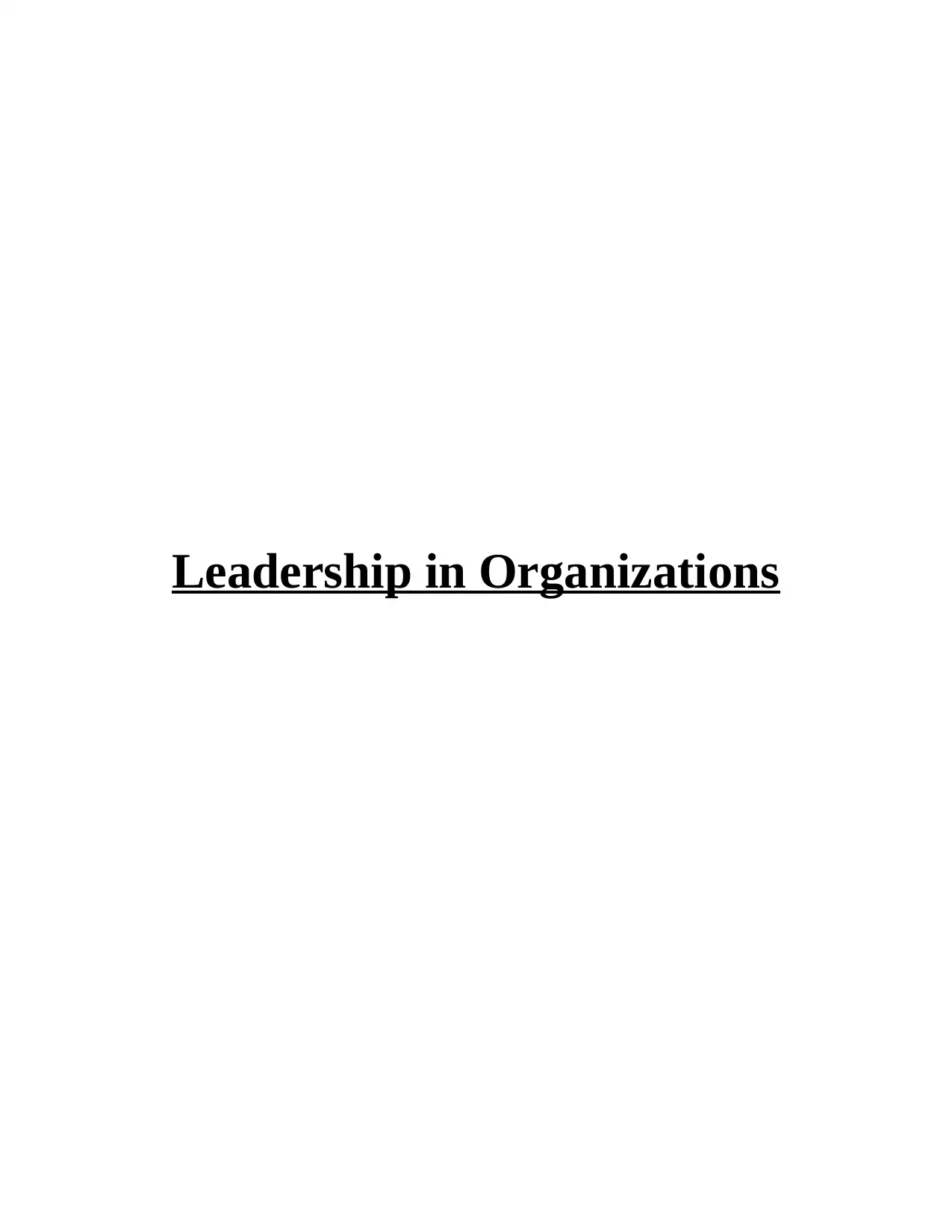
Leadership in Organizations
Paraphrase This Document
Need a fresh take? Get an instant paraphrase of this document with our AI Paraphraser
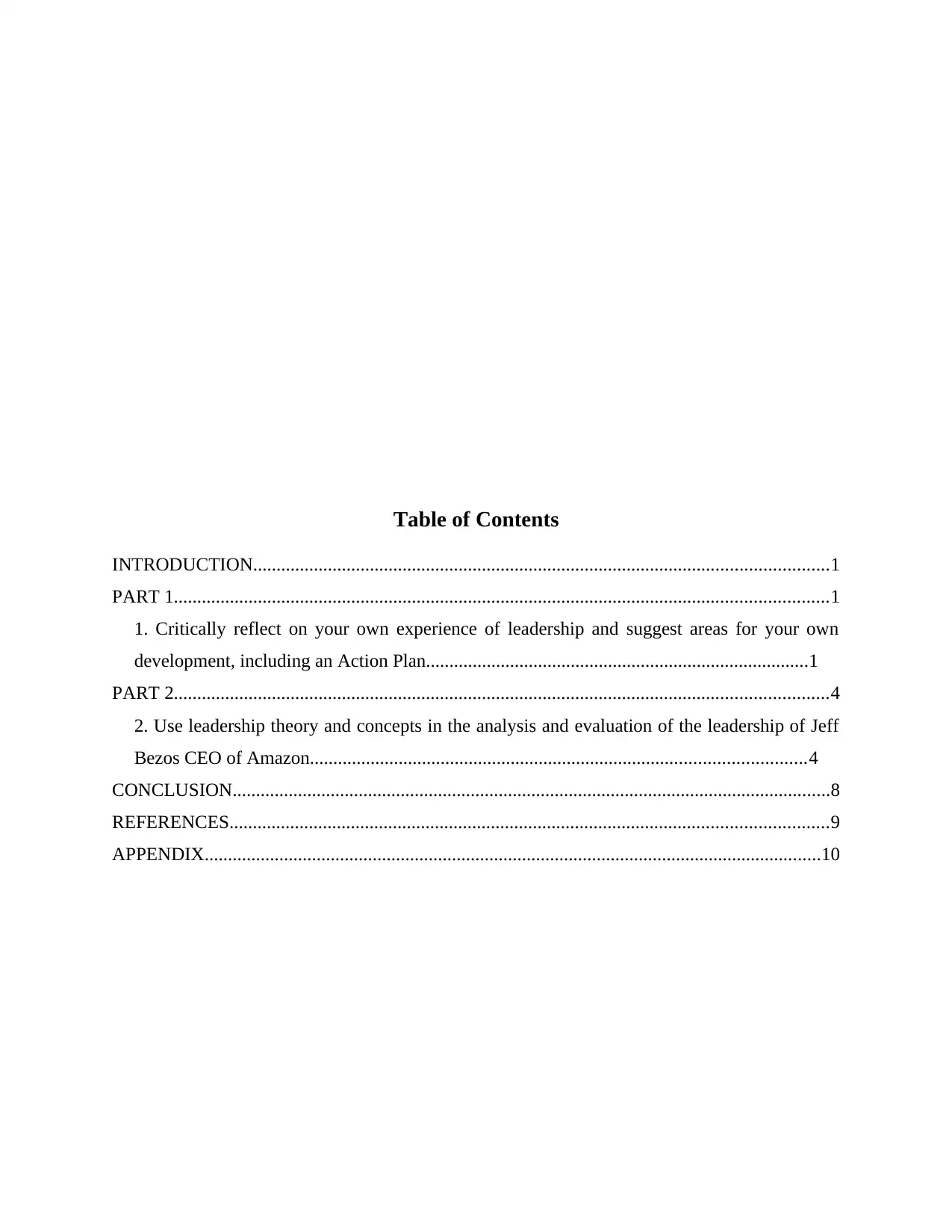
Table of Contents
INTRODUCTION...........................................................................................................................1
PART 1............................................................................................................................................1
1. Critically reflect on your own experience of leadership and suggest areas for your own
development, including an Action Plan..................................................................................1
PART 2............................................................................................................................................4
2. Use leadership theory and concepts in the analysis and evaluation of the leadership of Jeff
Bezos CEO of Amazon..........................................................................................................4
CONCLUSION................................................................................................................................8
REFERENCES................................................................................................................................9
APPENDIX....................................................................................................................................10
INTRODUCTION...........................................................................................................................1
PART 1............................................................................................................................................1
1. Critically reflect on your own experience of leadership and suggest areas for your own
development, including an Action Plan..................................................................................1
PART 2............................................................................................................................................4
2. Use leadership theory and concepts in the analysis and evaluation of the leadership of Jeff
Bezos CEO of Amazon..........................................................................................................4
CONCLUSION................................................................................................................................8
REFERENCES................................................................................................................................9
APPENDIX....................................................................................................................................10

⊘ This is a preview!⊘
Do you want full access?
Subscribe today to unlock all pages.

Trusted by 1+ million students worldwide
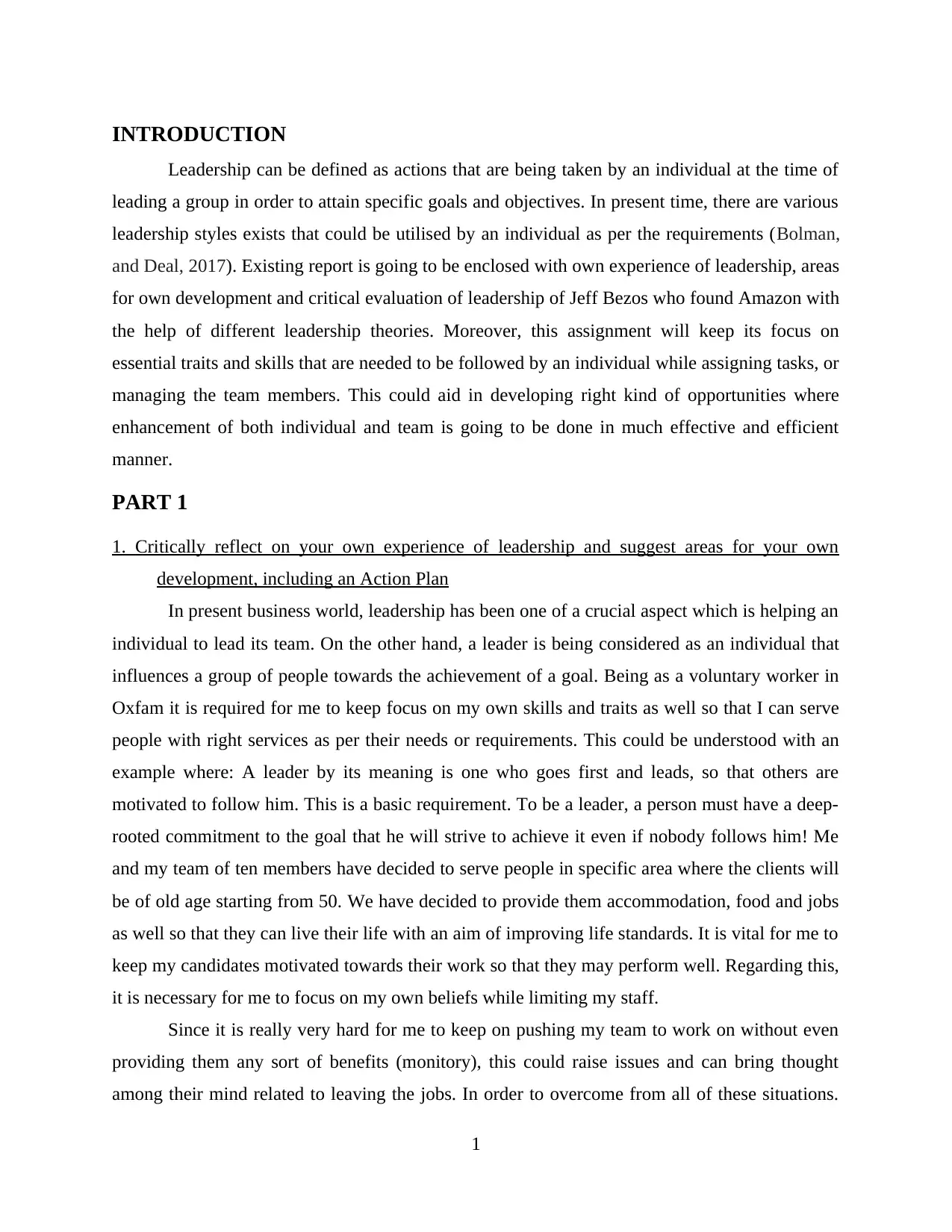
INTRODUCTION
Leadership can be defined as actions that are being taken by an individual at the time of
leading a group in order to attain specific goals and objectives. In present time, there are various
leadership styles exists that could be utilised by an individual as per the requirements (Bolman,
and Deal, 2017). Existing report is going to be enclosed with own experience of leadership, areas
for own development and critical evaluation of leadership of Jeff Bezos who found Amazon with
the help of different leadership theories. Moreover, this assignment will keep its focus on
essential traits and skills that are needed to be followed by an individual while assigning tasks, or
managing the team members. This could aid in developing right kind of opportunities where
enhancement of both individual and team is going to be done in much effective and efficient
manner.
PART 1
1. Critically reflect on your own experience of leadership and suggest areas for your own
development, including an Action Plan
In present business world, leadership has been one of a crucial aspect which is helping an
individual to lead its team. On the other hand, a leader is being considered as an individual that
influences a group of people towards the achievement of a goal. Being as a voluntary worker in
Oxfam it is required for me to keep focus on my own skills and traits as well so that I can serve
people with right services as per their needs or requirements. This could be understood with an
example where: A leader by its meaning is one who goes first and leads, so that others are
motivated to follow him. This is a basic requirement. To be a leader, a person must have a deep-
rooted commitment to the goal that he will strive to achieve it even if nobody follows him! Me
and my team of ten members have decided to serve people in specific area where the clients will
be of old age starting from 50. We have decided to provide them accommodation, food and jobs
as well so that they can live their life with an aim of improving life standards. It is vital for me to
keep my candidates motivated towards their work so that they may perform well. Regarding this,
it is necessary for me to focus on my own beliefs while limiting my staff.
Since it is really very hard for me to keep on pushing my team to work on without even
providing them any sort of benefits (monitory), this could raise issues and can bring thought
among their mind related to leaving the jobs. In order to overcome from all of these situations.
1
Leadership can be defined as actions that are being taken by an individual at the time of
leading a group in order to attain specific goals and objectives. In present time, there are various
leadership styles exists that could be utilised by an individual as per the requirements (Bolman,
and Deal, 2017). Existing report is going to be enclosed with own experience of leadership, areas
for own development and critical evaluation of leadership of Jeff Bezos who found Amazon with
the help of different leadership theories. Moreover, this assignment will keep its focus on
essential traits and skills that are needed to be followed by an individual while assigning tasks, or
managing the team members. This could aid in developing right kind of opportunities where
enhancement of both individual and team is going to be done in much effective and efficient
manner.
PART 1
1. Critically reflect on your own experience of leadership and suggest areas for your own
development, including an Action Plan
In present business world, leadership has been one of a crucial aspect which is helping an
individual to lead its team. On the other hand, a leader is being considered as an individual that
influences a group of people towards the achievement of a goal. Being as a voluntary worker in
Oxfam it is required for me to keep focus on my own skills and traits as well so that I can serve
people with right services as per their needs or requirements. This could be understood with an
example where: A leader by its meaning is one who goes first and leads, so that others are
motivated to follow him. This is a basic requirement. To be a leader, a person must have a deep-
rooted commitment to the goal that he will strive to achieve it even if nobody follows him! Me
and my team of ten members have decided to serve people in specific area where the clients will
be of old age starting from 50. We have decided to provide them accommodation, food and jobs
as well so that they can live their life with an aim of improving life standards. It is vital for me to
keep my candidates motivated towards their work so that they may perform well. Regarding this,
it is necessary for me to focus on my own beliefs while limiting my staff.
Since it is really very hard for me to keep on pushing my team to work on without even
providing them any sort of benefits (monitory), this could raise issues and can bring thought
among their mind related to leaving the jobs. In order to overcome from all of these situations.
1
Paraphrase This Document
Need a fresh take? Get an instant paraphrase of this document with our AI Paraphraser
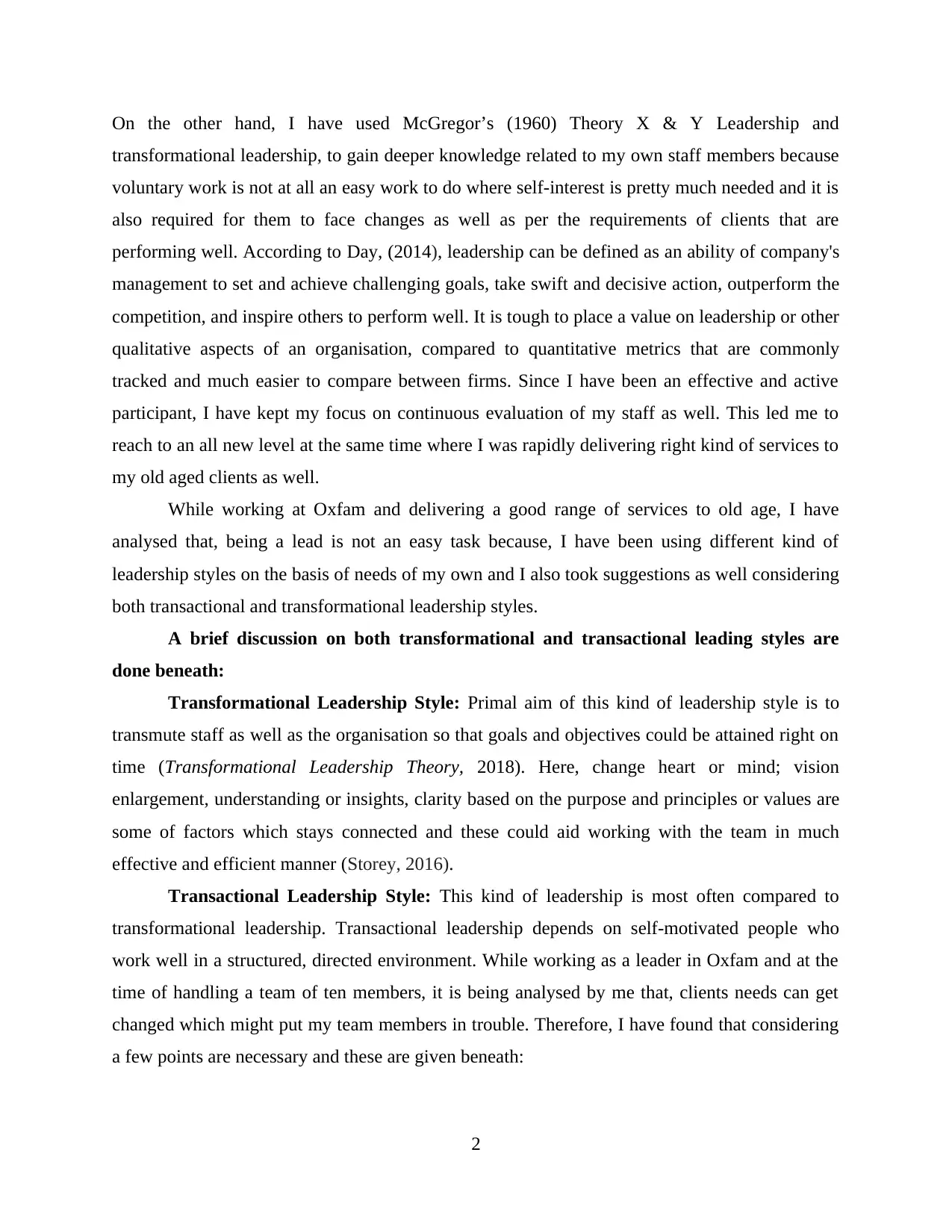
On the other hand, I have used McGregor’s (1960) Theory X & Y Leadership and
transformational leadership, to gain deeper knowledge related to my own staff members because
voluntary work is not at all an easy work to do where self-interest is pretty much needed and it is
also required for them to face changes as well as per the requirements of clients that are
performing well. According to Day, (2014), leadership can be defined as an ability of company's
management to set and achieve challenging goals, take swift and decisive action, outperform the
competition, and inspire others to perform well. It is tough to place a value on leadership or other
qualitative aspects of an organisation, compared to quantitative metrics that are commonly
tracked and much easier to compare between firms. Since I have been an effective and active
participant, I have kept my focus on continuous evaluation of my staff as well. This led me to
reach to an all new level at the same time where I was rapidly delivering right kind of services to
my old aged clients as well.
While working at Oxfam and delivering a good range of services to old age, I have
analysed that, being a lead is not an easy task because, I have been using different kind of
leadership styles on the basis of needs of my own and I also took suggestions as well considering
both transactional and transformational leadership styles.
A brief discussion on both transformational and transactional leading styles are
done beneath:
Transformational Leadership Style: Primal aim of this kind of leadership style is to
transmute staff as well as the organisation so that goals and objectives could be attained right on
time (Transformational Leadership Theory, 2018). Here, change heart or mind; vision
enlargement, understanding or insights, clarity based on the purpose and principles or values are
some of factors which stays connected and these could aid working with the team in much
effective and efficient manner (Storey, 2016).
Transactional Leadership Style: This kind of leadership is most often compared to
transformational leadership. Transactional leadership depends on self-motivated people who
work well in a structured, directed environment. While working as a leader in Oxfam and at the
time of handling a team of ten members, it is being analysed by me that, clients needs can get
changed which might put my team members in trouble. Therefore, I have found that considering
a few points are necessary and these are given beneath:
2
transformational leadership, to gain deeper knowledge related to my own staff members because
voluntary work is not at all an easy work to do where self-interest is pretty much needed and it is
also required for them to face changes as well as per the requirements of clients that are
performing well. According to Day, (2014), leadership can be defined as an ability of company's
management to set and achieve challenging goals, take swift and decisive action, outperform the
competition, and inspire others to perform well. It is tough to place a value on leadership or other
qualitative aspects of an organisation, compared to quantitative metrics that are commonly
tracked and much easier to compare between firms. Since I have been an effective and active
participant, I have kept my focus on continuous evaluation of my staff as well. This led me to
reach to an all new level at the same time where I was rapidly delivering right kind of services to
my old aged clients as well.
While working at Oxfam and delivering a good range of services to old age, I have
analysed that, being a lead is not an easy task because, I have been using different kind of
leadership styles on the basis of needs of my own and I also took suggestions as well considering
both transactional and transformational leadership styles.
A brief discussion on both transformational and transactional leading styles are
done beneath:
Transformational Leadership Style: Primal aim of this kind of leadership style is to
transmute staff as well as the organisation so that goals and objectives could be attained right on
time (Transformational Leadership Theory, 2018). Here, change heart or mind; vision
enlargement, understanding or insights, clarity based on the purpose and principles or values are
some of factors which stays connected and these could aid working with the team in much
effective and efficient manner (Storey, 2016).
Transactional Leadership Style: This kind of leadership is most often compared to
transformational leadership. Transactional leadership depends on self-motivated people who
work well in a structured, directed environment. While working as a leader in Oxfam and at the
time of handling a team of ten members, it is being analysed by me that, clients needs can get
changed which might put my team members in trouble. Therefore, I have found that considering
a few points are necessary and these are given beneath:
2
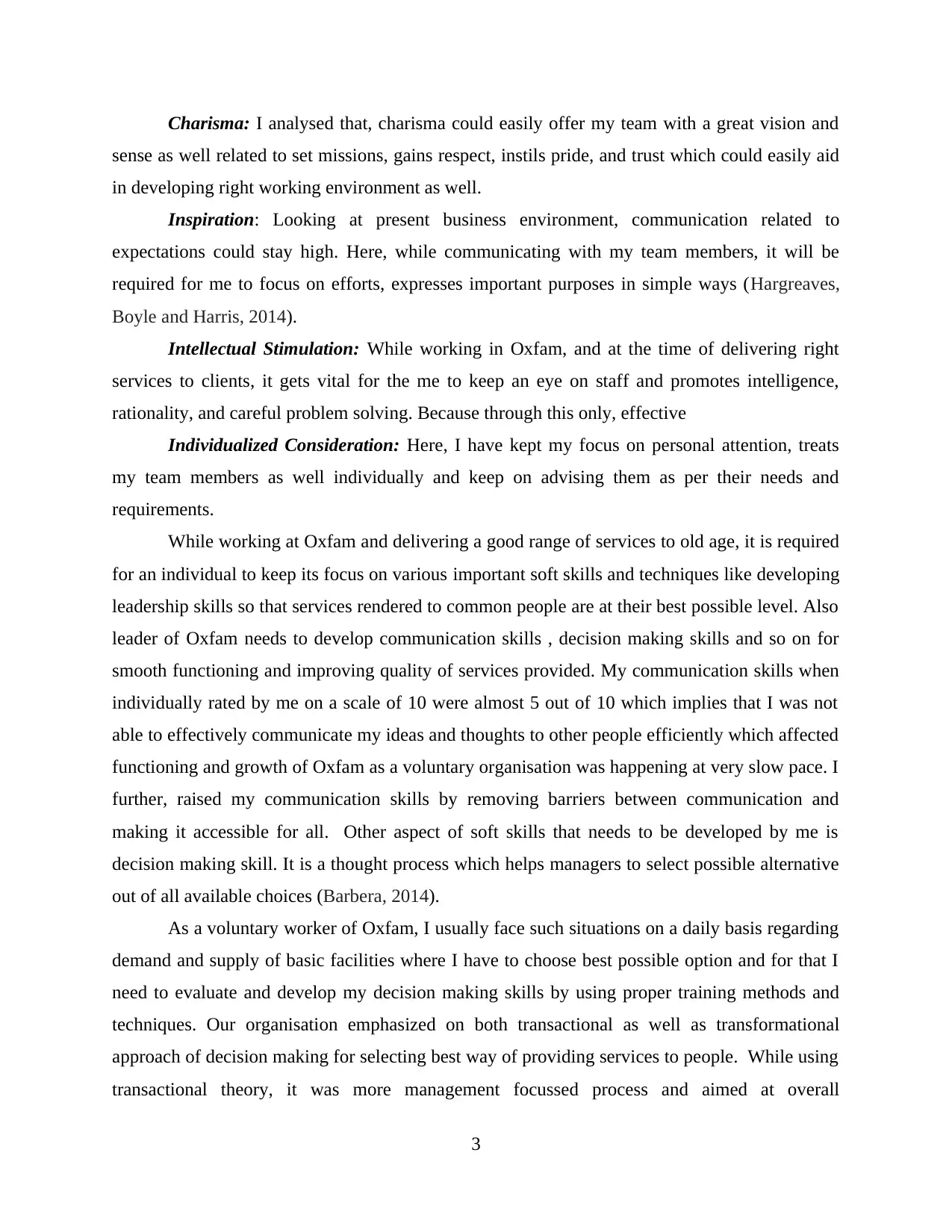
Charisma: I analysed that, charisma could easily offer my team with a great vision and
sense as well related to set missions, gains respect, instils pride, and trust which could easily aid
in developing right working environment as well.
Inspiration: Looking at present business environment, communication related to
expectations could stay high. Here, while communicating with my team members, it will be
required for me to focus on efforts, expresses important purposes in simple ways (Hargreaves,
Boyle and Harris, 2014).
Intellectual Stimulation: While working in Oxfam, and at the time of delivering right
services to clients, it gets vital for the me to keep an eye on staff and promotes intelligence,
rationality, and careful problem solving. Because through this only, effective
Individualized Consideration: Here, I have kept my focus on personal attention, treats
my team members as well individually and keep on advising them as per their needs and
requirements.
While working at Oxfam and delivering a good range of services to old age, it is required
for an individual to keep its focus on various important soft skills and techniques like developing
leadership skills so that services rendered to common people are at their best possible level. Also
leader of Oxfam needs to develop communication skills , decision making skills and so on for
smooth functioning and improving quality of services provided. My communication skills when
individually rated by me on a scale of 10 were almost 5 out of 10 which implies that I was not
able to effectively communicate my ideas and thoughts to other people efficiently which affected
functioning and growth of Oxfam as a voluntary organisation was happening at very slow pace. I
further, raised my communication skills by removing barriers between communication and
making it accessible for all. Other aspect of soft skills that needs to be developed by me is
decision making skill. It is a thought process which helps managers to select possible alternative
out of all available choices (Barbera, 2014).
As a voluntary worker of Oxfam, I usually face such situations on a daily basis regarding
demand and supply of basic facilities where I have to choose best possible option and for that I
need to evaluate and develop my decision making skills by using proper training methods and
techniques. Our organisation emphasized on both transactional as well as transformational
approach of decision making for selecting best way of providing services to people. While using
transactional theory, it was more management focussed process and aimed at overall
3
sense as well related to set missions, gains respect, instils pride, and trust which could easily aid
in developing right working environment as well.
Inspiration: Looking at present business environment, communication related to
expectations could stay high. Here, while communicating with my team members, it will be
required for me to focus on efforts, expresses important purposes in simple ways (Hargreaves,
Boyle and Harris, 2014).
Intellectual Stimulation: While working in Oxfam, and at the time of delivering right
services to clients, it gets vital for the me to keep an eye on staff and promotes intelligence,
rationality, and careful problem solving. Because through this only, effective
Individualized Consideration: Here, I have kept my focus on personal attention, treats
my team members as well individually and keep on advising them as per their needs and
requirements.
While working at Oxfam and delivering a good range of services to old age, it is required
for an individual to keep its focus on various important soft skills and techniques like developing
leadership skills so that services rendered to common people are at their best possible level. Also
leader of Oxfam needs to develop communication skills , decision making skills and so on for
smooth functioning and improving quality of services provided. My communication skills when
individually rated by me on a scale of 10 were almost 5 out of 10 which implies that I was not
able to effectively communicate my ideas and thoughts to other people efficiently which affected
functioning and growth of Oxfam as a voluntary organisation was happening at very slow pace. I
further, raised my communication skills by removing barriers between communication and
making it accessible for all. Other aspect of soft skills that needs to be developed by me is
decision making skill. It is a thought process which helps managers to select possible alternative
out of all available choices (Barbera, 2014).
As a voluntary worker of Oxfam, I usually face such situations on a daily basis regarding
demand and supply of basic facilities where I have to choose best possible option and for that I
need to evaluate and develop my decision making skills by using proper training methods and
techniques. Our organisation emphasized on both transactional as well as transformational
approach of decision making for selecting best way of providing services to people. While using
transactional theory, it was more management focussed process and aimed at overall
3
⊘ This is a preview!⊘
Do you want full access?
Subscribe today to unlock all pages.

Trusted by 1+ million students worldwide
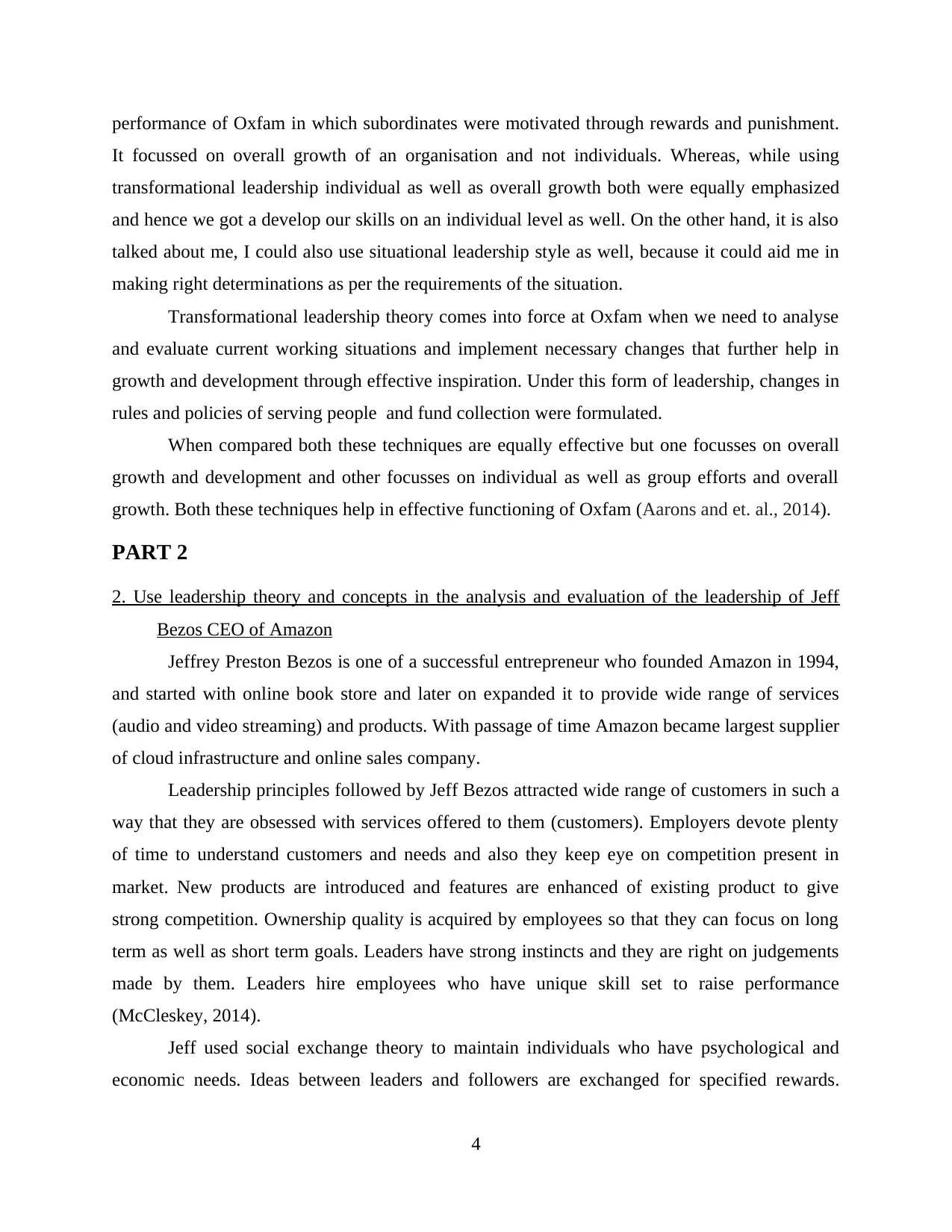
performance of Oxfam in which subordinates were motivated through rewards and punishment.
It focussed on overall growth of an organisation and not individuals. Whereas, while using
transformational leadership individual as well as overall growth both were equally emphasized
and hence we got a develop our skills on an individual level as well. On the other hand, it is also
talked about me, I could also use situational leadership style as well, because it could aid me in
making right determinations as per the requirements of the situation.
Transformational leadership theory comes into force at Oxfam when we need to analyse
and evaluate current working situations and implement necessary changes that further help in
growth and development through effective inspiration. Under this form of leadership, changes in
rules and policies of serving people and fund collection were formulated.
When compared both these techniques are equally effective but one focusses on overall
growth and development and other focusses on individual as well as group efforts and overall
growth. Both these techniques help in effective functioning of Oxfam (Aarons and et. al., 2014).
PART 2
2. Use leadership theory and concepts in the analysis and evaluation of the leadership of Jeff
Bezos CEO of Amazon
Jeffrey Preston Bezos is one of a successful entrepreneur who founded Amazon in 1994,
and started with online book store and later on expanded it to provide wide range of services
(audio and video streaming) and products. With passage of time Amazon became largest supplier
of cloud infrastructure and online sales company.
Leadership principles followed by Jeff Bezos attracted wide range of customers in such a
way that they are obsessed with services offered to them (customers). Employers devote plenty
of time to understand customers and needs and also they keep eye on competition present in
market. New products are introduced and features are enhanced of existing product to give
strong competition. Ownership quality is acquired by employees so that they can focus on long
term as well as short term goals. Leaders have strong instincts and they are right on judgements
made by them. Leaders hire employees who have unique skill set to raise performance
(McCleskey, 2014).
Jeff used social exchange theory to maintain individuals who have psychological and
economic needs. Ideas between leaders and followers are exchanged for specified rewards.
4
It focussed on overall growth of an organisation and not individuals. Whereas, while using
transformational leadership individual as well as overall growth both were equally emphasized
and hence we got a develop our skills on an individual level as well. On the other hand, it is also
talked about me, I could also use situational leadership style as well, because it could aid me in
making right determinations as per the requirements of the situation.
Transformational leadership theory comes into force at Oxfam when we need to analyse
and evaluate current working situations and implement necessary changes that further help in
growth and development through effective inspiration. Under this form of leadership, changes in
rules and policies of serving people and fund collection were formulated.
When compared both these techniques are equally effective but one focusses on overall
growth and development and other focusses on individual as well as group efforts and overall
growth. Both these techniques help in effective functioning of Oxfam (Aarons and et. al., 2014).
PART 2
2. Use leadership theory and concepts in the analysis and evaluation of the leadership of Jeff
Bezos CEO of Amazon
Jeffrey Preston Bezos is one of a successful entrepreneur who founded Amazon in 1994,
and started with online book store and later on expanded it to provide wide range of services
(audio and video streaming) and products. With passage of time Amazon became largest supplier
of cloud infrastructure and online sales company.
Leadership principles followed by Jeff Bezos attracted wide range of customers in such a
way that they are obsessed with services offered to them (customers). Employers devote plenty
of time to understand customers and needs and also they keep eye on competition present in
market. New products are introduced and features are enhanced of existing product to give
strong competition. Ownership quality is acquired by employees so that they can focus on long
term as well as short term goals. Leaders have strong instincts and they are right on judgements
made by them. Leaders hire employees who have unique skill set to raise performance
(McCleskey, 2014).
Jeff used social exchange theory to maintain individuals who have psychological and
economic needs. Ideas between leaders and followers are exchanged for specified rewards.
4
Paraphrase This Document
Need a fresh take? Get an instant paraphrase of this document with our AI Paraphraser
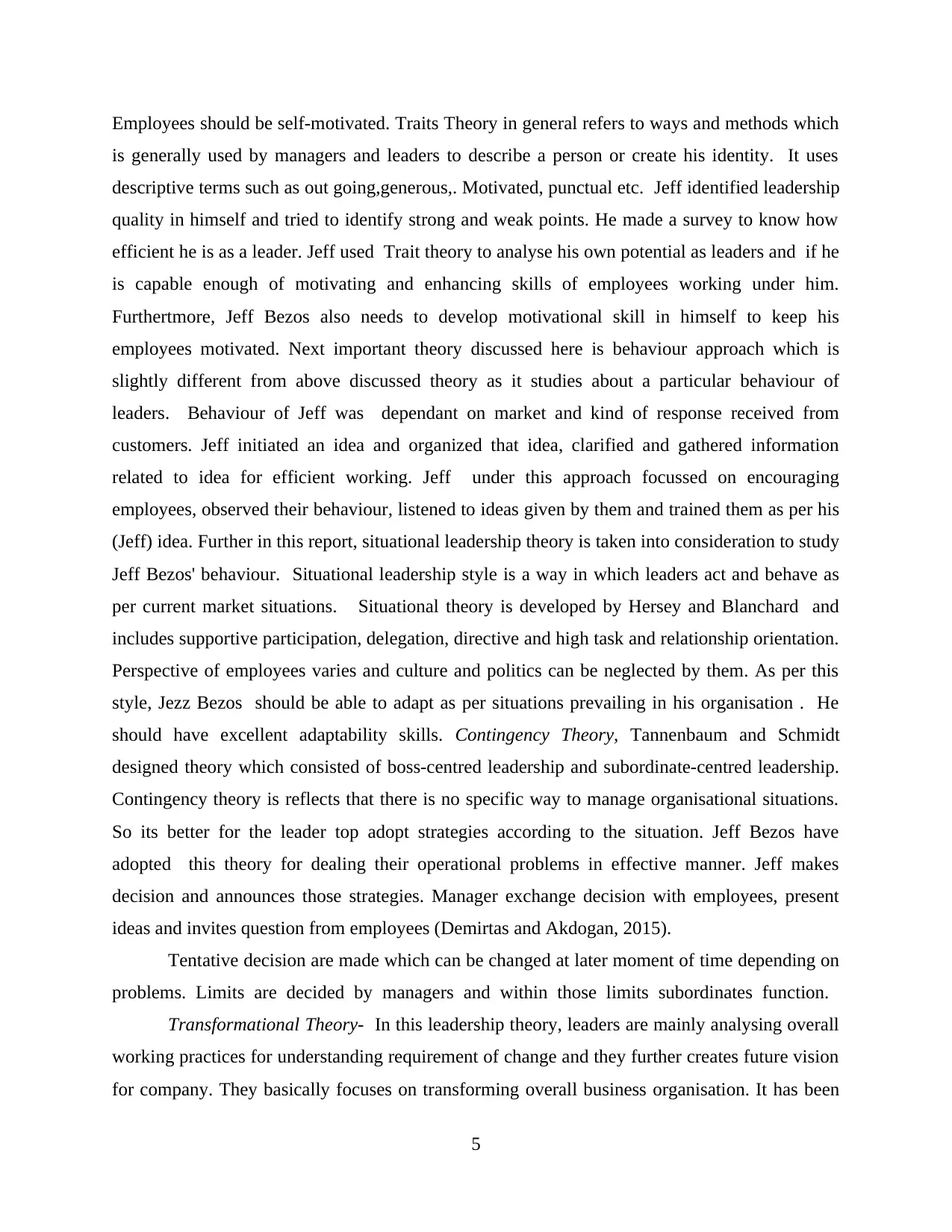
Employees should be self-motivated. Traits Theory in general refers to ways and methods which
is generally used by managers and leaders to describe a person or create his identity. It uses
descriptive terms such as out going,generous,. Motivated, punctual etc. Jeff identified leadership
quality in himself and tried to identify strong and weak points. He made a survey to know how
efficient he is as a leader. Jeff used Trait theory to analyse his own potential as leaders and if he
is capable enough of motivating and enhancing skills of employees working under him.
Furthertmore, Jeff Bezos also needs to develop motivational skill in himself to keep his
employees motivated. Next important theory discussed here is behaviour approach which is
slightly different from above discussed theory as it studies about a particular behaviour of
leaders. Behaviour of Jeff was dependant on market and kind of response received from
customers. Jeff initiated an idea and organized that idea, clarified and gathered information
related to idea for efficient working. Jeff under this approach focussed on encouraging
employees, observed their behaviour, listened to ideas given by them and trained them as per his
(Jeff) idea. Further in this report, situational leadership theory is taken into consideration to study
Jeff Bezos' behaviour. Situational leadership style is a way in which leaders act and behave as
per current market situations. Situational theory is developed by Hersey and Blanchard and
includes supportive participation, delegation, directive and high task and relationship orientation.
Perspective of employees varies and culture and politics can be neglected by them. As per this
style, Jezz Bezos should be able to adapt as per situations prevailing in his organisation . He
should have excellent adaptability skills. Contingency Theory, Tannenbaum and Schmidt
designed theory which consisted of boss-centred leadership and subordinate-centred leadership.
Contingency theory is reflects that there is no specific way to manage organisational situations.
So its better for the leader top adopt strategies according to the situation. Jeff Bezos have
adopted this theory for dealing their operational problems in effective manner. Jeff makes
decision and announces those strategies. Manager exchange decision with employees, present
ideas and invites question from employees (Demirtas and Akdogan, 2015).
Tentative decision are made which can be changed at later moment of time depending on
problems. Limits are decided by managers and within those limits subordinates function.
Transformational Theory- In this leadership theory, leaders are mainly analysing overall
working practices for understanding requirement of change and they further creates future vision
for company. They basically focuses on transforming overall business organisation. It has been
5
is generally used by managers and leaders to describe a person or create his identity. It uses
descriptive terms such as out going,generous,. Motivated, punctual etc. Jeff identified leadership
quality in himself and tried to identify strong and weak points. He made a survey to know how
efficient he is as a leader. Jeff used Trait theory to analyse his own potential as leaders and if he
is capable enough of motivating and enhancing skills of employees working under him.
Furthertmore, Jeff Bezos also needs to develop motivational skill in himself to keep his
employees motivated. Next important theory discussed here is behaviour approach which is
slightly different from above discussed theory as it studies about a particular behaviour of
leaders. Behaviour of Jeff was dependant on market and kind of response received from
customers. Jeff initiated an idea and organized that idea, clarified and gathered information
related to idea for efficient working. Jeff under this approach focussed on encouraging
employees, observed their behaviour, listened to ideas given by them and trained them as per his
(Jeff) idea. Further in this report, situational leadership theory is taken into consideration to study
Jeff Bezos' behaviour. Situational leadership style is a way in which leaders act and behave as
per current market situations. Situational theory is developed by Hersey and Blanchard and
includes supportive participation, delegation, directive and high task and relationship orientation.
Perspective of employees varies and culture and politics can be neglected by them. As per this
style, Jezz Bezos should be able to adapt as per situations prevailing in his organisation . He
should have excellent adaptability skills. Contingency Theory, Tannenbaum and Schmidt
designed theory which consisted of boss-centred leadership and subordinate-centred leadership.
Contingency theory is reflects that there is no specific way to manage organisational situations.
So its better for the leader top adopt strategies according to the situation. Jeff Bezos have
adopted this theory for dealing their operational problems in effective manner. Jeff makes
decision and announces those strategies. Manager exchange decision with employees, present
ideas and invites question from employees (Demirtas and Akdogan, 2015).
Tentative decision are made which can be changed at later moment of time depending on
problems. Limits are decided by managers and within those limits subordinates function.
Transformational Theory- In this leadership theory, leaders are mainly analysing overall
working practices for understanding requirement of change and they further creates future vision
for company. They basically focuses on transforming overall business organisation. It has been
5
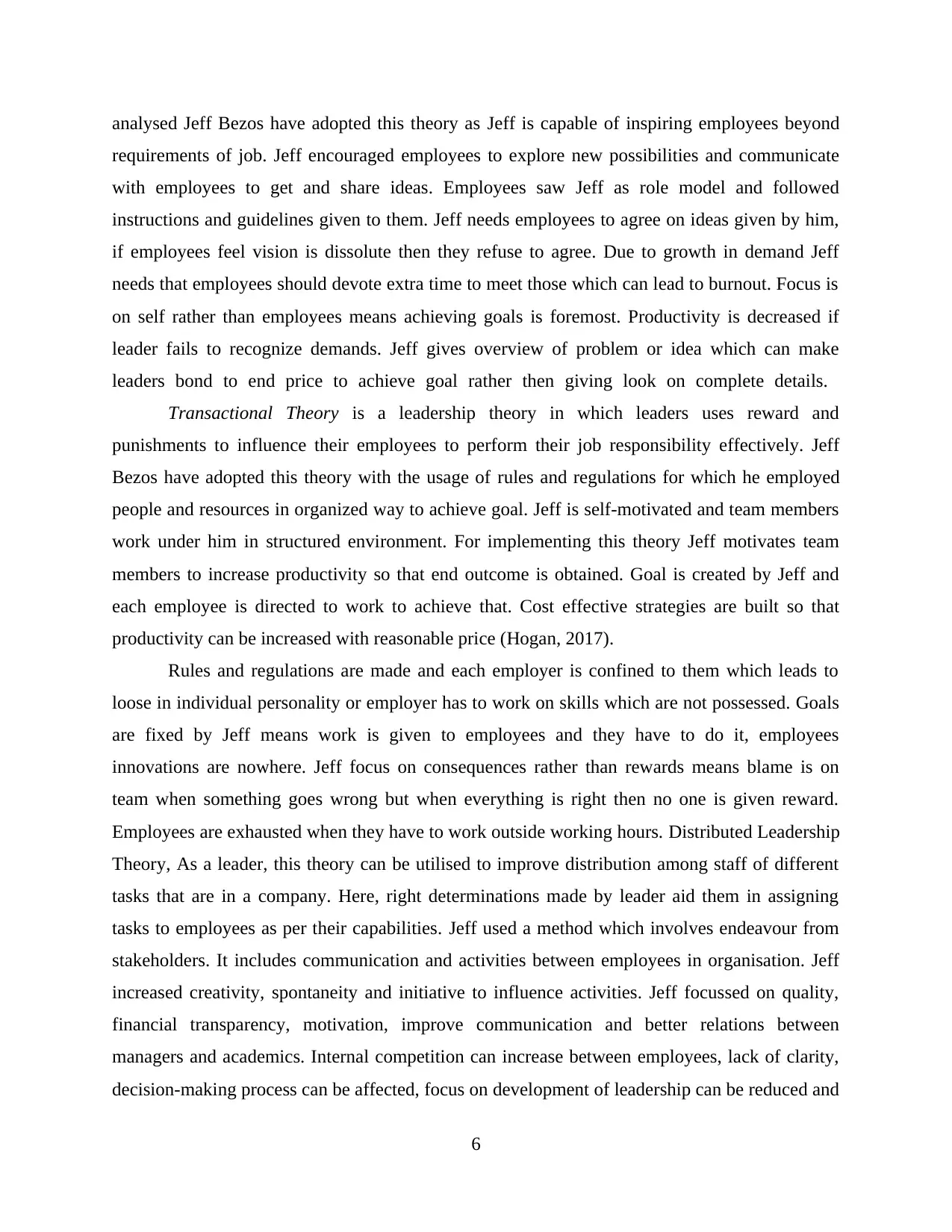
analysed Jeff Bezos have adopted this theory as Jeff is capable of inspiring employees beyond
requirements of job. Jeff encouraged employees to explore new possibilities and communicate
with employees to get and share ideas. Employees saw Jeff as role model and followed
instructions and guidelines given to them. Jeff needs employees to agree on ideas given by him,
if employees feel vision is dissolute then they refuse to agree. Due to growth in demand Jeff
needs that employees should devote extra time to meet those which can lead to burnout. Focus is
on self rather than employees means achieving goals is foremost. Productivity is decreased if
leader fails to recognize demands. Jeff gives overview of problem or idea which can make
leaders bond to end price to achieve goal rather then giving look on complete details.
Transactional Theory is a leadership theory in which leaders uses reward and
punishments to influence their employees to perform their job responsibility effectively. Jeff
Bezos have adopted this theory with the usage of rules and regulations for which he employed
people and resources in organized way to achieve goal. Jeff is self-motivated and team members
work under him in structured environment. For implementing this theory Jeff motivates team
members to increase productivity so that end outcome is obtained. Goal is created by Jeff and
each employee is directed to work to achieve that. Cost effective strategies are built so that
productivity can be increased with reasonable price (Hogan, 2017).
Rules and regulations are made and each employer is confined to them which leads to
loose in individual personality or employer has to work on skills which are not possessed. Goals
are fixed by Jeff means work is given to employees and they have to do it, employees
innovations are nowhere. Jeff focus on consequences rather than rewards means blame is on
team when something goes wrong but when everything is right then no one is given reward.
Employees are exhausted when they have to work outside working hours. Distributed Leadership
Theory, As a leader, this theory can be utilised to improve distribution among staff of different
tasks that are in a company. Here, right determinations made by leader aid them in assigning
tasks to employees as per their capabilities. Jeff used a method which involves endeavour from
stakeholders. It includes communication and activities between employees in organisation. Jeff
increased creativity, spontaneity and initiative to influence activities. Jeff focussed on quality,
financial transparency, motivation, improve communication and better relations between
managers and academics. Internal competition can increase between employees, lack of clarity,
decision-making process can be affected, focus on development of leadership can be reduced and
6
requirements of job. Jeff encouraged employees to explore new possibilities and communicate
with employees to get and share ideas. Employees saw Jeff as role model and followed
instructions and guidelines given to them. Jeff needs employees to agree on ideas given by him,
if employees feel vision is dissolute then they refuse to agree. Due to growth in demand Jeff
needs that employees should devote extra time to meet those which can lead to burnout. Focus is
on self rather than employees means achieving goals is foremost. Productivity is decreased if
leader fails to recognize demands. Jeff gives overview of problem or idea which can make
leaders bond to end price to achieve goal rather then giving look on complete details.
Transactional Theory is a leadership theory in which leaders uses reward and
punishments to influence their employees to perform their job responsibility effectively. Jeff
Bezos have adopted this theory with the usage of rules and regulations for which he employed
people and resources in organized way to achieve goal. Jeff is self-motivated and team members
work under him in structured environment. For implementing this theory Jeff motivates team
members to increase productivity so that end outcome is obtained. Goal is created by Jeff and
each employee is directed to work to achieve that. Cost effective strategies are built so that
productivity can be increased with reasonable price (Hogan, 2017).
Rules and regulations are made and each employer is confined to them which leads to
loose in individual personality or employer has to work on skills which are not possessed. Goals
are fixed by Jeff means work is given to employees and they have to do it, employees
innovations are nowhere. Jeff focus on consequences rather than rewards means blame is on
team when something goes wrong but when everything is right then no one is given reward.
Employees are exhausted when they have to work outside working hours. Distributed Leadership
Theory, As a leader, this theory can be utilised to improve distribution among staff of different
tasks that are in a company. Here, right determinations made by leader aid them in assigning
tasks to employees as per their capabilities. Jeff used a method which involves endeavour from
stakeholders. It includes communication and activities between employees in organisation. Jeff
increased creativity, spontaneity and initiative to influence activities. Jeff focussed on quality,
financial transparency, motivation, improve communication and better relations between
managers and academics. Internal competition can increase between employees, lack of clarity,
decision-making process can be affected, focus on development of leadership can be reduced and
6
⊘ This is a preview!⊘
Do you want full access?
Subscribe today to unlock all pages.

Trusted by 1+ million students worldwide
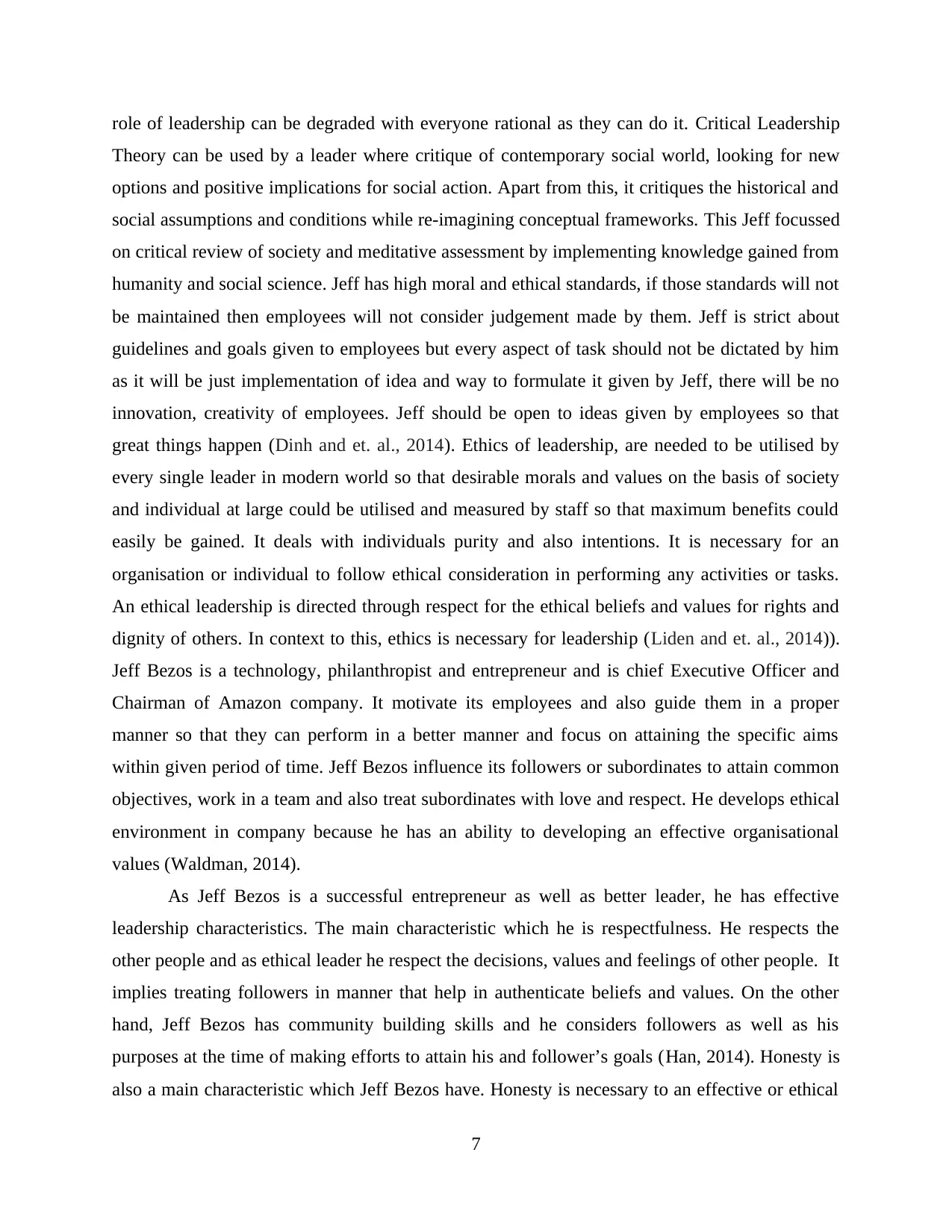
role of leadership can be degraded with everyone rational as they can do it. Critical Leadership
Theory can be used by a leader where critique of contemporary social world, looking for new
options and positive implications for social action. Apart from this, it critiques the historical and
social assumptions and conditions while re-imagining conceptual frameworks. This Jeff focussed
on critical review of society and meditative assessment by implementing knowledge gained from
humanity and social science. Jeff has high moral and ethical standards, if those standards will not
be maintained then employees will not consider judgement made by them. Jeff is strict about
guidelines and goals given to employees but every aspect of task should not be dictated by him
as it will be just implementation of idea and way to formulate it given by Jeff, there will be no
innovation, creativity of employees. Jeff should be open to ideas given by employees so that
great things happen (Dinh and et. al., 2014). Ethics of leadership, are needed to be utilised by
every single leader in modern world so that desirable morals and values on the basis of society
and individual at large could be utilised and measured by staff so that maximum benefits could
easily be gained. It deals with individuals purity and also intentions. It is necessary for an
organisation or individual to follow ethical consideration in performing any activities or tasks.
An ethical leadership is directed through respect for the ethical beliefs and values for rights and
dignity of others. In context to this, ethics is necessary for leadership (Liden and et. al., 2014)).
Jeff Bezos is a technology, philanthropist and entrepreneur and is chief Executive Officer and
Chairman of Amazon company. It motivate its employees and also guide them in a proper
manner so that they can perform in a better manner and focus on attaining the specific aims
within given period of time. Jeff Bezos influence its followers or subordinates to attain common
objectives, work in a team and also treat subordinates with love and respect. He develops ethical
environment in company because he has an ability to developing an effective organisational
values (Waldman, 2014).
As Jeff Bezos is a successful entrepreneur as well as better leader, he has effective
leadership characteristics. The main characteristic which he is respectfulness. He respects the
other people and as ethical leader he respect the decisions, values and feelings of other people. It
implies treating followers in manner that help in authenticate beliefs and values. On the other
hand, Jeff Bezos has community building skills and he considers followers as well as his
purposes at the time of making efforts to attain his and follower’s goals (Han, 2014). Honesty is
also a main characteristic which Jeff Bezos have. Honesty is necessary to an effective or ethical
7
Theory can be used by a leader where critique of contemporary social world, looking for new
options and positive implications for social action. Apart from this, it critiques the historical and
social assumptions and conditions while re-imagining conceptual frameworks. This Jeff focussed
on critical review of society and meditative assessment by implementing knowledge gained from
humanity and social science. Jeff has high moral and ethical standards, if those standards will not
be maintained then employees will not consider judgement made by them. Jeff is strict about
guidelines and goals given to employees but every aspect of task should not be dictated by him
as it will be just implementation of idea and way to formulate it given by Jeff, there will be no
innovation, creativity of employees. Jeff should be open to ideas given by employees so that
great things happen (Dinh and et. al., 2014). Ethics of leadership, are needed to be utilised by
every single leader in modern world so that desirable morals and values on the basis of society
and individual at large could be utilised and measured by staff so that maximum benefits could
easily be gained. It deals with individuals purity and also intentions. It is necessary for an
organisation or individual to follow ethical consideration in performing any activities or tasks.
An ethical leadership is directed through respect for the ethical beliefs and values for rights and
dignity of others. In context to this, ethics is necessary for leadership (Liden and et. al., 2014)).
Jeff Bezos is a technology, philanthropist and entrepreneur and is chief Executive Officer and
Chairman of Amazon company. It motivate its employees and also guide them in a proper
manner so that they can perform in a better manner and focus on attaining the specific aims
within given period of time. Jeff Bezos influence its followers or subordinates to attain common
objectives, work in a team and also treat subordinates with love and respect. He develops ethical
environment in company because he has an ability to developing an effective organisational
values (Waldman, 2014).
As Jeff Bezos is a successful entrepreneur as well as better leader, he has effective
leadership characteristics. The main characteristic which he is respectfulness. He respects the
other people and as ethical leader he respect the decisions, values and feelings of other people. It
implies treating followers in manner that help in authenticate beliefs and values. On the other
hand, Jeff Bezos has community building skills and he considers followers as well as his
purposes at the time of making efforts to attain his and follower’s goals (Han, 2014). Honesty is
also a main characteristic which Jeff Bezos have. Honesty is necessary to an effective or ethical
7
Paraphrase This Document
Need a fresh take? Get an instant paraphrase of this document with our AI Paraphraser
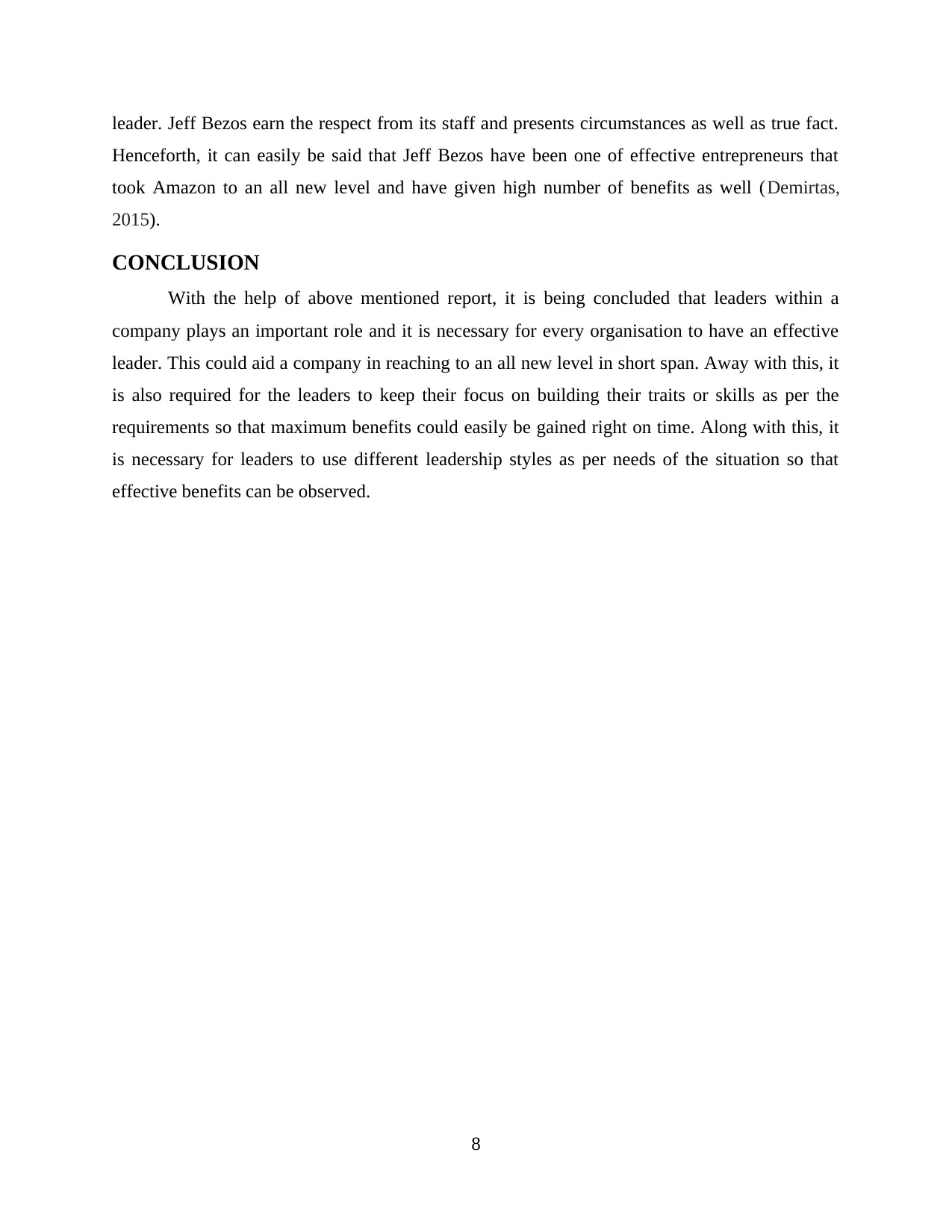
leader. Jeff Bezos earn the respect from its staff and presents circumstances as well as true fact.
Henceforth, it can easily be said that Jeff Bezos have been one of effective entrepreneurs that
took Amazon to an all new level and have given high number of benefits as well (Demirtas,
2015).
CONCLUSION
With the help of above mentioned report, it is being concluded that leaders within a
company plays an important role and it is necessary for every organisation to have an effective
leader. This could aid a company in reaching to an all new level in short span. Away with this, it
is also required for the leaders to keep their focus on building their traits or skills as per the
requirements so that maximum benefits could easily be gained right on time. Along with this, it
is necessary for leaders to use different leadership styles as per needs of the situation so that
effective benefits can be observed.
8
Henceforth, it can easily be said that Jeff Bezos have been one of effective entrepreneurs that
took Amazon to an all new level and have given high number of benefits as well (Demirtas,
2015).
CONCLUSION
With the help of above mentioned report, it is being concluded that leaders within a
company plays an important role and it is necessary for every organisation to have an effective
leader. This could aid a company in reaching to an all new level in short span. Away with this, it
is also required for the leaders to keep their focus on building their traits or skills as per the
requirements so that maximum benefits could easily be gained right on time. Along with this, it
is necessary for leaders to use different leadership styles as per needs of the situation so that
effective benefits can be observed.
8
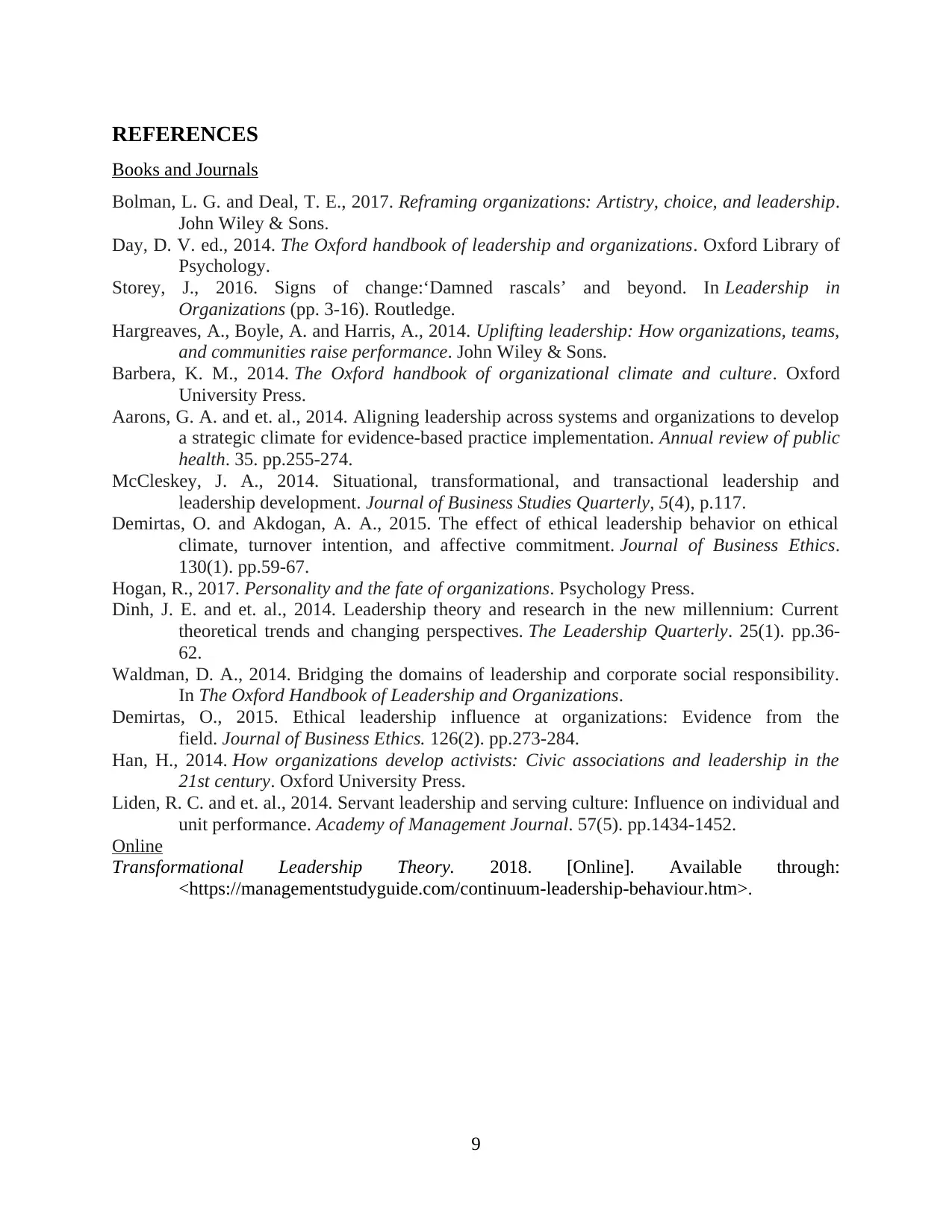
REFERENCES
Books and Journals
Bolman, L. G. and Deal, T. E., 2017. Reframing organizations: Artistry, choice, and leadership.
John Wiley & Sons.
Day, D. V. ed., 2014. The Oxford handbook of leadership and organizations. Oxford Library of
Psychology.
Storey, J., 2016. Signs of change:‘Damned rascals’ and beyond. In Leadership in
Organizations (pp. 3-16). Routledge.
Hargreaves, A., Boyle, A. and Harris, A., 2014. Uplifting leadership: How organizations, teams,
and communities raise performance. John Wiley & Sons.
Barbera, K. M., 2014. The Oxford handbook of organizational climate and culture. Oxford
University Press.
Aarons, G. A. and et. al., 2014. Aligning leadership across systems and organizations to develop
a strategic climate for evidence-based practice implementation. Annual review of public
health. 35. pp.255-274.
McCleskey, J. A., 2014. Situational, transformational, and transactional leadership and
leadership development. Journal of Business Studies Quarterly, 5(4), p.117.
Demirtas, O. and Akdogan, A. A., 2015. The effect of ethical leadership behavior on ethical
climate, turnover intention, and affective commitment. Journal of Business Ethics.
130(1). pp.59-67.
Hogan, R., 2017. Personality and the fate of organizations. Psychology Press.
Dinh, J. E. and et. al., 2014. Leadership theory and research in the new millennium: Current
theoretical trends and changing perspectives. The Leadership Quarterly. 25(1). pp.36-
62.
Waldman, D. A., 2014. Bridging the domains of leadership and corporate social responsibility.
In The Oxford Handbook of Leadership and Organizations.
Demirtas, O., 2015. Ethical leadership influence at organizations: Evidence from the
field. Journal of Business Ethics. 126(2). pp.273-284.
Han, H., 2014. How organizations develop activists: Civic associations and leadership in the
21st century. Oxford University Press.
Liden, R. C. and et. al., 2014. Servant leadership and serving culture: Influence on individual and
unit performance. Academy of Management Journal. 57(5). pp.1434-1452.
Online
Transformational Leadership Theory. 2018. [Online]. Available through:
<https://managementstudyguide.com/continuum-leadership-behaviour.htm>.
9
Books and Journals
Bolman, L. G. and Deal, T. E., 2017. Reframing organizations: Artistry, choice, and leadership.
John Wiley & Sons.
Day, D. V. ed., 2014. The Oxford handbook of leadership and organizations. Oxford Library of
Psychology.
Storey, J., 2016. Signs of change:‘Damned rascals’ and beyond. In Leadership in
Organizations (pp. 3-16). Routledge.
Hargreaves, A., Boyle, A. and Harris, A., 2014. Uplifting leadership: How organizations, teams,
and communities raise performance. John Wiley & Sons.
Barbera, K. M., 2014. The Oxford handbook of organizational climate and culture. Oxford
University Press.
Aarons, G. A. and et. al., 2014. Aligning leadership across systems and organizations to develop
a strategic climate for evidence-based practice implementation. Annual review of public
health. 35. pp.255-274.
McCleskey, J. A., 2014. Situational, transformational, and transactional leadership and
leadership development. Journal of Business Studies Quarterly, 5(4), p.117.
Demirtas, O. and Akdogan, A. A., 2015. The effect of ethical leadership behavior on ethical
climate, turnover intention, and affective commitment. Journal of Business Ethics.
130(1). pp.59-67.
Hogan, R., 2017. Personality and the fate of organizations. Psychology Press.
Dinh, J. E. and et. al., 2014. Leadership theory and research in the new millennium: Current
theoretical trends and changing perspectives. The Leadership Quarterly. 25(1). pp.36-
62.
Waldman, D. A., 2014. Bridging the domains of leadership and corporate social responsibility.
In The Oxford Handbook of Leadership and Organizations.
Demirtas, O., 2015. Ethical leadership influence at organizations: Evidence from the
field. Journal of Business Ethics. 126(2). pp.273-284.
Han, H., 2014. How organizations develop activists: Civic associations and leadership in the
21st century. Oxford University Press.
Liden, R. C. and et. al., 2014. Servant leadership and serving culture: Influence on individual and
unit performance. Academy of Management Journal. 57(5). pp.1434-1452.
Online
Transformational Leadership Theory. 2018. [Online]. Available through:
<https://managementstudyguide.com/continuum-leadership-behaviour.htm>.
9
⊘ This is a preview!⊘
Do you want full access?
Subscribe today to unlock all pages.

Trusted by 1+ million students worldwide
1 out of 13
Related Documents
Your All-in-One AI-Powered Toolkit for Academic Success.
+13062052269
info@desklib.com
Available 24*7 on WhatsApp / Email
![[object Object]](/_next/static/media/star-bottom.7253800d.svg)
Unlock your academic potential
Copyright © 2020–2026 A2Z Services. All Rights Reserved. Developed and managed by ZUCOL.





